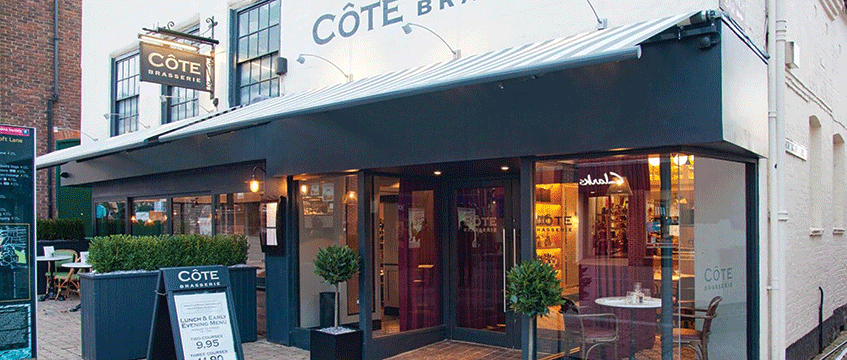COMMENT: For the past 25 years, retail has been the staple commercial property asset for auction buyers.
Today, high street retail still accounts for more than 65% of assets sold at auction, but it has to fight through the torrent of bad news that continues to come.
Many high streets will survive but few will be in the form that they are today.
Given that retail sector’s well-publicised problems, we have seen a move into other asset classes and this has been reflected in what has been selling at auction.
Investors who know the best locations and which retailers have the most persuasive offer are continuing to invest enthusiastically.
A 2,222 sq ft shop in Bell Street, Henley, Oxfordshire, let to FatFace at a current rent of £50,000 pa sold for £820,000 at a yield of 5.71%
A 1,227 sq ft shop on Stamford High Street, Lincolnshire, which has recently been let on a new 10-year lease to Hotel Chocolat at a current rent of £47,000 pa, was sold for £962,000 – a 4.2% yield.
A restaurant in Newbury, Berkshire, let to Côte Restaurants until 2034 at a current rent of £92,500 pa sold for £1.52m – a yield of 5.62%.
Drink-fuelled recovery
The licensed premises sector has recently seen a renaissance, but only where the tenant is one of the financially strong majors and the rent has not been fixed at artificially high levels. The Graduate, a freehold bar and restaurant in York that is let to Stonegate Pub Company until 2030 at a current rent of £152,553 pa, sold for £2.5m – a yield of 5.7%.
But with funds to invest, the private investor has been pushed towards investments that have a retail bias but without the risk of the high street.
Out-of-town stores and supermarkets have increasingly become an alternative to buying on the high street.
B&M is a highly regarded retailer. Two B&M stores offered in July attracted strong interest and sold for £900,000 and £800,000 at yields of 7.3% and 7.6%, respectively.
In April, a 23,000 sq ft retail unit on Park Road, Liverpool, sold for £2.95m at a yield of 5.75%. The current tenant is B&M Retail, which is paying a rent of £180,500 on a lease expiring at the end of this year.
Investors are looking at trade counters as a kind of “proxy shop” which – because they are essentially warehouses with a retail kicker – means their value is underpinned by the kind of long-term potential that is currently fuelling the logistics and fulfilment centre market. They are, in effect, a clever “each-way bet”.
A Travis Perkins trade counter in Melton Mowbray, Leicestershire, sold for £1.4m at a yield of 4.38%. With nine years unexpired on the lease and no break options, the investment currently produces rental income of £65,000 pa.
In July, three trade counter investments let to Travis Perkins sold for £1.45m, £1.12m and £800,000 at respective yields of 6.2%, 4.3% and 6.7%.
Drive-thrus, too, have been very popular. Usually they are newly let to well-known traders in prominent positions.
A long-leasehold McDonald’s drive-thru in Bradford, Yorkshire, let until 2047 at a current rent of £64,950 pa, sold for £1.3m, a yield of 4.71%,
Relatively new to the scene, garden centres are being viewed with increasing enthusiasm by investors.
Investors seeking secure long-term income like the long leases, prevalence of RPI or CPI-linked leases and also the future for potential residential development.
Reflecting these characteristics, a Wyevale Garden Centre investment in Wimborne Minster, Dorset, attracted competitive bidding and sold for £1.855m at a yield of 6.6%.
The recent extension of the leases to the Secretary of State for Housing, Communities and Local Government of many Job Centres across the UK has provided investors with a rare opportunity to invest in a triple-A covenant.
In Pudsey, Yorkshire, a 20,979 sq ft Job Centre producing an income of £121,800 pa sold for £1.7m, a 6.7% yield.
Buy and hold
There have been few opportunities for private investors to buy industrial investments.
The sector has been the preserve of the institutions which have not been sellers, preferring instead to hold these assets for their rental growth and the perceived defensive qualities of the logistics sector. Industrials that do come into the auction room have been snapped up.
A 29,105 sq ft freehold, index-linked asset at Luton, Bedfordshire, close to the M1, sold for £2.1m – a 5.6% yield.
Meanwhile, offices have seen a quiet comeback. Not long ago regional offices felt like a friendless asset class, and the relaxation of permitted development rights over the past decade saw swathes of office space removed from the market by residential conversions.
However, the sector is now the subject of increased investor support and standalone business park office buildings in Winnersh, Berkshire, and Luton sold at prices which reflected capital values of more than £210 per sq ft.
A vacant 12,263 sq ft office close to Heathrow Airport, offered with a guide price of £975,000, sold for £2.54m
In the offices sector, 60 Abbeygate Street in Bury St Edmunds, Suffolk – a 4,632 sq ft building with parking let until 2025 at a current rent of £80,000 – sold for £1.3m at a yield of 5.81%.
Richard Auterac is chairman of Acuitus











